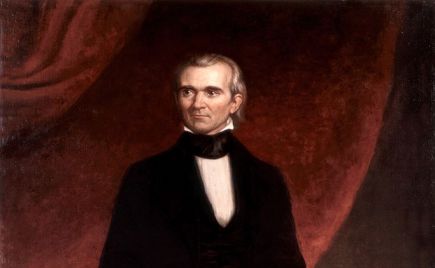First Words: James Polk, March 4, 1845

Not many Americans know James Knox Polk, but they should. He was a rather consequential president and an astute political leader who fought the Mexican War; expanded the Union to the Southwest and West; and solidified national economic policy. Polk was the first dark horse candidate ever to be nominated by a major political party and elected to the presidency. His candidacy was made possible after Martin van Buren committed political suicide by opposing the annexation of Texas. Polk beat Henry Clay by the closest margin in history —1,338,464 popular votes to Clay's 1,300,097—a difference of 38,367 votes. Even though Clay won five slave states, including Polk’s home state of Tennessee and North Carolina, Polk netted 170 electoral votes to Clay's 105. As president, Polk's agenda was driven by four of the most contentious issues of the Jacksonian Era: territorial expansion, slavery, banking, and the tariff. Polk assumed the presidency with a focused political agenda.
At his Inauguration on March 4, 1845, Polk spoke at length about his political agenda and the convictions of his positions. Polk promised to administer the government in the true spirit of the Constitution and promised not to assume any powers not expressed or implied in the document:
The government of the United States is one of delegated and limited powers, and it is by a strict adherence to the clearly granted powers and by abstaining from the exercise of doubtful or unauthorized implied powers that we have the only sure guaranty against the recurrence of those unfortunate collisions between the federal and state authorities which have occasionally so much disturbed the harmony of our system and even threatened the perpetuity of our glorious Union.
After expressing his view of the role of the federal government under the Constitution, Polk stated his opposition to a national bank and to the assumption of state debt:
I shall steadily oppose the creation of those institutions and systems which in their nature tend to pervert it from its legitimate purposes and make it the instrument of sections, classes, and individuals. We need no national banks or other extraneous institutions planted around the government to control or strengthen it in opposition to the will of its authors…
Ours was intended to be a plain and frugal government, and I shall regard it to be my duty to recommend to Congress and, as far as the executive is concerned, to enforce by all the means within my power the strictest economy in the expenditure of the public money which may be compatible with the public interests…
A national debt has become almost an institution of European monarchies. It is viewed in some of them as an essential prop to existing governments. Melancholy is the condition of that people whose government can be sustained only by a system which periodically transfers large amounts from the labor of the many to the coffers of the few. Such a system is incompatible with the ends for which our republican government was instituted.
While Polk opposed the revenue tariff, he reasoned his support for a protective tariff and equal taxation:
I have heretofore declared to my fellow-citizens that "in my judgment it is the duty of the government to extend, as far as it may be practicable to do so, by its revenue laws and all other means within its power, fair and just protection to all of the great interests of the whole Union, embracing agriculture, manufactures, the mechanic arts, commerce, and navigation." I have also declared my opinion to be "in favor of a tariff for revenue," and that "in adjusting the details of such a tariff I have sanctioned such moderate discriminating duties as would produce the amount of revenue needed and at the same time afford reasonable incidental protection to our home industry," and that I was "opposed to a tariff for protection merely, and not for revenue."
Polk promised to leave after one term and did so as the most successful President since George Washington in the accomplishment of his goals. On a side note, the inauguration of James K. Polk was the first to be covered by telegraph - the events of the ceremony were telegraphed to Baltimore by Samuel Morse on his year-old invention. Polk’s was also first known newspaper illustration of a presidential inauguration, which appeared in The Illustrated London News.